Since welcoming its first ever international student in 2014, YK Pao School’s international cohort has grown from a humble single-student programme to an almost fifty-strong cohort across the Middle School and High School.
The school’s approach is unique, with both international and Chinese students living side-by-side and sharing classes together. As the High School offers a seven-day boarding programme, students from across the globe – including the USA, the UK, Canada, Ireland, South Korea, Indonesia and Singapore – have the opportunity to live and study in a truly immersive Chinese language and cultural environment.
Andrew Hamilton, the school’s International Head of Admissions, states that it is very rare for a school to offer a programme like this for international students at a Chinese School. Mr. Hamilton feels that the mix of Chinese and international students bring a global perspective to the school, a place where students can share languages, traditions, and perspectives.
“These [international students] are wonderful people who have chosen a path quite different from their international peers. Most already share some connection to Chinese language, and/or culture and see YK Pao School as a place where they can continue to develop those connections.”
——Mr. Hamilton
To understand more about why some of these connections have drawn students to YK Pao School and the international student experience, this week we met with three of our newly arrived international students: Karen, Non and Louis.
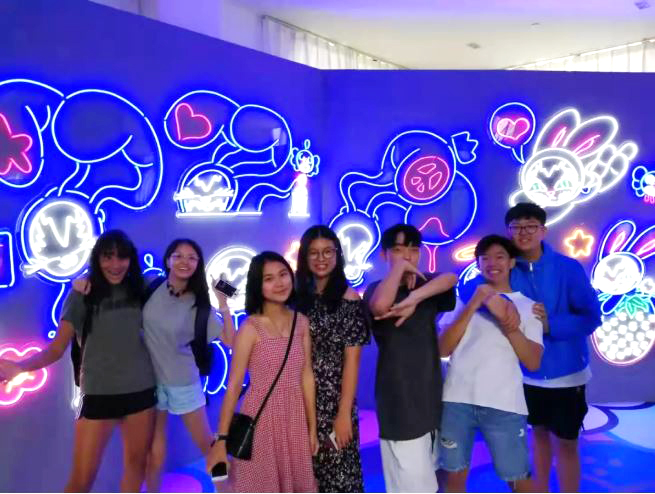
Karen (third from left), Non (second from right) and Louis (third from right)
This photo was taken right after they arrived
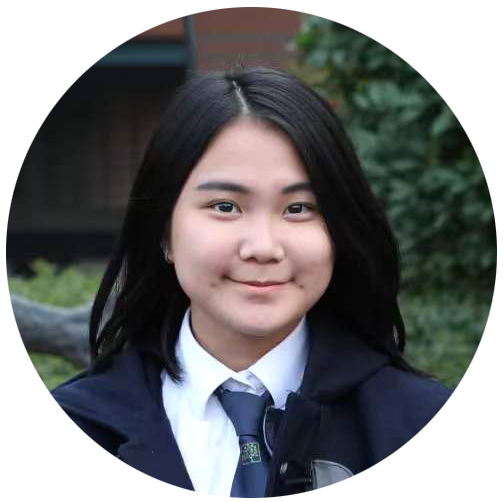
Karen
Indonesia – Year 11
At first, Karen was drawn to China by the wealth of opportunities that awaited her, "It is a great experience for me to learn more about a new culture, have a new experience, have more friends and just do something new."
Karen is from Indonesia, but her family has roots in Xiamen, China. Though she is learning Mandarin now, she grew up speaking a dialect of Chinese – Hokkien – mostly communicating with her family using a mix of English, Indonesian and Hokkien. Her family’s heritage gave her an interest in exploring Chinese culture – including learning the guqin and the language.
When choosing YK Pao School, Karen was drawn to the strong academics, particularly the IB Diploma Programme as it well-known, well-regarded, and she feels will make it easier to go to her future university. Alongside academics, Karen feels that the school’s study culture is teaching her important skills for the future. After arrival, Karen was surprised by the strict deadlines and schedules at YK Pao School, which differed massively to her experience at school in Indonesia. She states that she has now become used to this aspect of school life and that her timekeeping has improved, which she notes is an important skill for the life at University.
However, life at YK Pao School is more than just academics and deadlines.
Through one of the High Schools co-curricular options, Karen has been able to fulfil a lifelong desire to take up a Chinese instrument in learning how to play the guqin. Since childhood, Karen and her mother sought out teachers to learn the guzheng, a similar instrument, but they were unable to find a teacher in Jakarta. She notes that she is interested in all instruments, but is particularly interested in the guqin because it is a horizontally-laid harp and that it is very different to the other instruments she can play. Alongside guqin, Karen has joined the Chinese Calligraphy club, explaining that she initially joined the club to learn more about Chinese culture and also to improve her Chinese handwriting. Unexpectedly, she has found that learning calligraphy has helped her relax more – noting that she previously used to be an anxious person.
Ever since I joined the Chinese calligraphy club, I learned to calm myself down more and learned the beauty behind the Chinese characters.
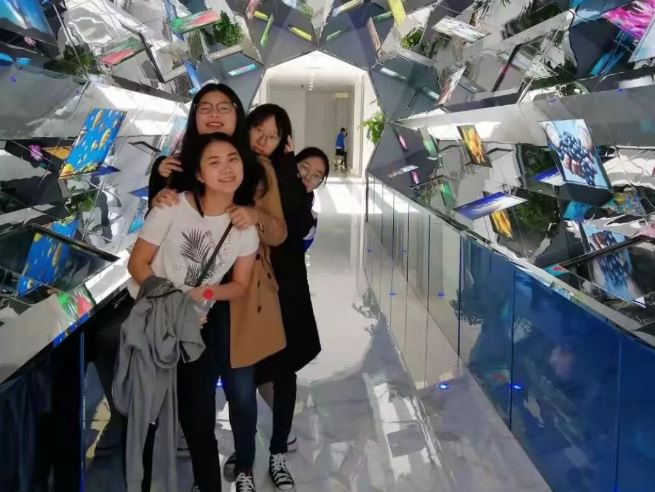
Karen (the girl in white) with her friends
Aside from academics and co-curricular, all of our interviewees highlighted how influential life as a boarder at the School has been on their experience.
These experiences include weekly weekend excursions and activities, organized as part of the seven-day boarding programme. Over recent weekends Mark Cheong, the Head of Seven-Day Boarding, has taken students to enjoy activities such as hiking, ice skating, cooking classes, learning how to play mah-jong, visiting art festivals and trying out different foods such as Korean, Thai, Indian and American.
Karen feels that these experiences allow her to embrace new things and to have a chance to enjoy Chinese culture outside of the classroom. “Almost every weekend I go out of school and explore Shanghai and other cities like Suzhou, and maybe soon we are going to Hangzhou. I feel like this programme lets me explore China itself.” She explains.
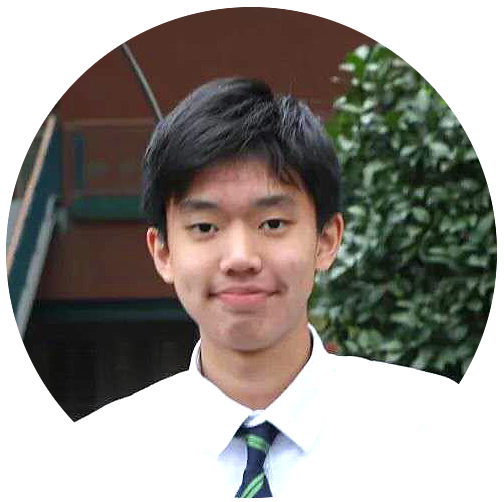
Non
Thailand – Year 11
Originally hailing from Thailand, Non arrived at YK Pao School in the autumn of 2019, choosing to study in China to broaden his understanding of the world and improve his Chinese language abilities. After arriving at the school, Non initially had many changes to get used to, having had to adapt to his new classmates, living with roommates and speaking Chinese daily, "I was kind of starstruck because it was my first time in a boarding school, in a foreign country, at a foreign school."
Despite being a foreign country, China has elements of home, with Non’s grandfather having emigrated from southern China and his grandmother growing up with Chinese parents in Thailand. In his childhood, Non frequently spoke Mandarin with his grandmother and also became familiar with Chinese culture. However, he feels, although he understands and feels comfortable with Chinese culture, in Thailand he only scraped the surface – at the school he lives the culture day-to-day. " Both my Chinese family [in Thailand] and people in China, are kind of the same. We really prioritise our family, respect and filial piety."
However, Non emphasizes strongly, language has still been his biggest challenge. Undeterred by this, Non has been facing these barriers head-on, feeling that so far he has been able to develop not only his language skills but also his independence – he now manages his own time and notes that when he wants to do something, he must go and arrange it himself. Non also praised his teachers who have supported him in overcoming these difficulties.
The teachers are always available when the students need them. Whenever I need help, I just contact them, because I know that they’re at school and sometimes, in cases when I am struggling in my classes, I can arrange to meet them.
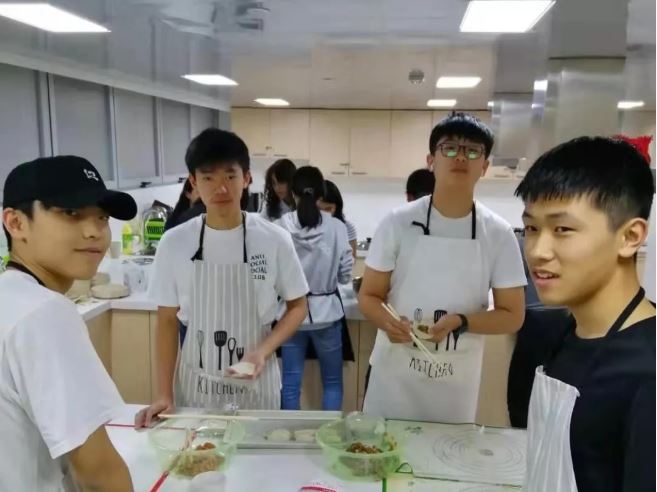
Non (second from left) and Louis (first from left)
One such teacher is Stella Fu, who has been teaching Mandarin Language to international students at Pao School for over five years. She notes that, like Non, many students find the language initially difficult but that with time and work, they improve rapidly. This improvement is in part due to the school’s immersive language environment, small class sizes – never exceed four students - and that as a teacher she is able to give a lot of attention to the students as individuals. Though, she notes, the most important thing to remember is, “Don’t be afraid to speak!” Like Ms. Fu, Non recommends perseverance – saying that day-by-day students improve and, without realizing, they soon are able to communicate at a level that was previously unattainable.
Outside of the classroom, Non also enjoys taking part in sports at every possible opportunity and is a member of the school’s varsity basketball team. At first, he was intimidated, as getting into the team was competitive and the team mostly spoke Chinese, however over time they became close friends and a strong team.

Louis
South Korea – Year 10
Unlike many students, Louis has had the experience of studying at many different types of schools. These schools were both public and international, in both the US and Korea. Due to this wide experience, he was able to navigate the new school and culture with confidence. Louis has been learning Chinese for on-and-off since sixth grade, becoming interested in learning the language due to China’s growing global influence and power. He feels that knowing how to speak Chinese is becoming an essential skill and also has an interest in the way the language compares to his mother tongue, "When I first started learning Chinese, I found a lot of similarities with Korean, which sparked my interest in learning Chinese more seriously."
In choosing YK Pao School, Louis wanted to challenge himself and learn new things, though whilst his primary focus has been Chinese language, he also wanted to build up life skills such as maturity and independence. He was specifically interested in life as a boarder – hoping it would improve his independence and build up his self-reliance. Now, Louis is responsible for managing his own time and feels that since coming to the school he has become more responsible. Alongside seeking out a boarding school, Louis was drawn to the teachers at YK Pao School, which eventually became the reason he chose the school.
In my mind, YK Pao School is the most welcoming school – the teachers seem to actually care. They’re not just acting like they care, but they’re actually genuinely interested in me.
Since arriving, he explains that the academics at the school are made easier by the teachers because of their proactivity and help. He feels that they are always eager to initiate discussion about topics, provide resources and genuinely want to get to know him. But, it isn’t just the teachers that make the Pao School community unique. Louis has also found that his fellow students are a fundamental part of what makes the school special. "The students here are really welcoming and I think that they are not too competitive, but they are competitive enough that they can motivate me... there is a really good balance that both motivates me and makes me feel like part of a group."
Part of this balance can also be reflected in Pao School’s programme – a blend of academic and co-curricular activities. Louis enjoys using his co-curricular and spare time playing sports – in particular, he enjoys badminton and has been playing for five years.